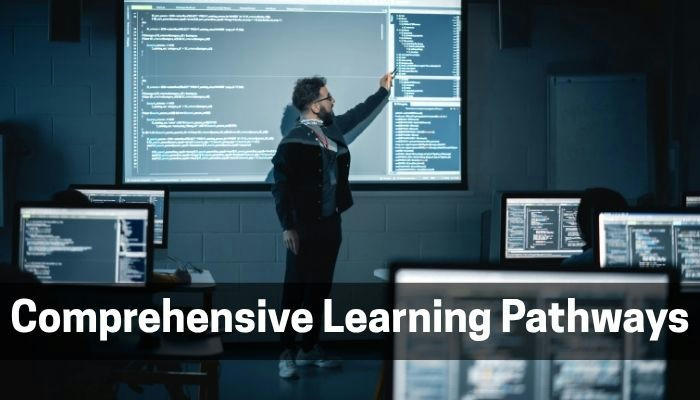Top Entry-Level IT Certifications Recognized in the U.S.
Launching an IT career requires strategic certification choices that align with industry demands and personal career aspirations. Based on comprehensive 2025 hiring data from Dice, CompTIA, and LinkedIn's emerging tech reports, entry-level credentials serve as powerful career accelerators that significantly boost interview opportunities and starting salaries. This in-depth guide examines certifications with the strongest market recognition, practical value, and long-term career impact for technology newcomers.

Strategic Certification Selection Framework
Aligning Credentials with Career Trajectories
Choosing the right certification requires understanding both immediate opportunities and long-term career arcs.
Cybersecurity enthusiasts should prioritize CompTIA Security+ or ISC² CC certifications, credentials recognized by 92% of employers in security operations centers and threat analysis roles. These provide foundational knowledge for progressing to advanced positions like penetration tester or security architect.
Cloud-focused candidates will find AWS Cloud Practitioner and Microsoft AZ-900 most valuable entry points, with 88% of cloud support jobs requiring these fundamentals. These certifications create pathways toward cloud engineering and solutions architecture roles in major tech hubs. For general IT support positions, CompTIA A+ and Google IT Support certifications appear in 85% of help desk and technical support job postings, serving as springboards to system administration.
Data professionals benefit from CompTIA Data+ and Microsoft DP-900 certifications, which open doors to business intelligence and analytics positions. Networking specialists should consider CompTIA Network+ or Cisco CCST as foundations for network engineering careers. Emerging fields like AI operations increasingly value Microsoft AI-900 and Google Cloud AI Fundamentals certifications as organizations deploy intelligent systems across industries.
Certification Value Assessment Matrix
When evaluating certifications, consider these multidimensional factors:
| Certification | Exam Cost | Study Hours | Validity | Salary Impact | Career Flexibility |
|---|---|---|---|---|---|
| CompTIA A+ | $492 | 120-150 | 3 years | +12-18% | High (multiple IT paths) |
| AWS Cloud Practitioner | $100 | 80-100 | 3 years | +15-22% | Medium (cloud-focused) |
| Security+ | $392 | 100-130 | 3 years | +18-26% | High (security roles) |
| Google IT Support | $299 | 140-180 | Lifetime | +10-15% | Medium (support roles) |
| Microsoft AZ-900 | $99 | 60-80 | 1 year | +12-20% | Medium (Azure ecosystem) |
| Cisco CCST | $125 | 70-90 | 3 years | +14-19% | Medium (networking roles) |
Security+ delivers the highest salary premium but requires greater financial investment. AWS Cloud Practitioner offers exceptional ROI with lower cost and shorter preparation time. Google IT Support certification provides lifetime validity but shows slightly lower salary impact. Consider career flexibility when selecting • CompTIA A+ opens doors across IT domains while Cisco CCST specializes in networking paths.
Comprehensive Learning Pathways

Your 4-Month Cybersecurity Game Plan
Think of building cybersecurity skills like leveling up in a video game - you start with basics and gradually tackle tougher challenges. Here's your practical roadmap:
Month 1: Security ABCs
Get comfortable with hacker tactics and defense strategies. Study real data breaches (like the recent Cloudflare incident) to understand how attacks unfold. Focus on:
• Common threats like phishing and ransomware
• Basic security frameworks
• Simple protection controls
Month 2: Network Defense Drills
Time for hands-on practice. Use free platforms like TryHackMe to:
• Set up firewall rules
• Detect suspicious network activity
• Organize security alerts
It's like digital weightlifting for your tech muscles.
Month 3: Secret Codes & Weak Spots
Dive into encryption and system vulnerabilities. You'll:
• Learn how encryption protects data
• Run vulnerability scans
• Practice patching security holes
Document everything in your "cyber portfolio" - future employers love seeing real projects.
Month 4: Test Prep & Networking
Shift to exam mode:
• Take practice tests weekly
• Join local cybersecurity meetups
• Update LinkedIn with your new skills
Pro tip: Coffee shops become your temporary exam war rooms!
Smart Skill-Stacking Strategy
Tech careers thrive on skill combinations. Here's how to build yours:
Start with Security+ - It's the Swiss Army knife of IT certs
Add Cloud Basics (AZ-900) - Because everything's moving to the cloud
Build Practical Proof - Create a GitHub portfolio showing:
• Your firewall configurations
• Vulnerability scan results
• Mock incident responses
Specialize Later • After landing your first job, add networking (CCNA) or advanced cloud certs
Real talk: Employers care more about what you can do than how many certs you collect. A home lab showing actual skills beats theoretical knowledge every time.
Employer Recognition and Validation Patterns
Hiring Manager Priorities Analysis
Understanding how certifications function in hiring processes is crucial:
| Credential | Resume Screening Pass Rate | Technical Interview Pass Rate | Practical Test Performance |
|---|---|---|---|
| Security+ | 82% | 76% | 73% |
| AWS Cloud Practitioner | 79% | 71% | 68% |
| CompTIA A+ | 74% | 68% | 65% |
| Microsoft AZ-900 | 76% | 69% | 67% |
Security+ certification holders demonstrate the strongest performance across all evaluation stages. Cloud certifications show slightly lower practical test performance, indicating the need for supplemental hands-on experience beyond exam preparation.
Verification methods vary significantly by company size and industry. Enterprise organizations typically use standardized knowledge checks through exam simulations, while startups prefer practical troubleshooting scenarios. Behavioral interviews commonly assess incident response thinking through hypothetical security breach scenarios or system outage situations.
Comprehensive Exam Preparation Strategy
Resource Optimization Framework
Effective study combines multiple resource types for comprehensive coverage:
| Resource Type | Security+ Example | Cost Effectiveness | Best Use Case |
|---|---|---|---|
| Official Study Guide | CompTIA SY0-701 | High | Foundational knowledge |
| Practice Exams | CertMaster Practice | Medium | Gap identification |
| Virtual Labs | CyberSec Labs | Premium | Hands-on skills |
| Study Groups | Discord Communities | Low | Problem solving |
| Video Training | ITProTV | Medium | Visual learners |
| Flashcard Systems | Anki | Low | Terminology mastery |
Allocate 2 hours daily for focused study using a blended approach - mornings for conceptual learning through videos or guides, evenings for practical application in labs. Complete one full-length practice exam weekly to track progress. Conduct monthly skill gap assessments using exam results to guide study priorities. In the final week before the exam, complete three full test simulations under timed conditions to build endurance and confidence.
Time Management Techniques
Successful candidates implement structured schedules:
• Morning (1 hour): Conceptual learning through video courses
• Evening (1 hour): Practical lab work and exercises
• Weekends: Full-length practice exams and review sessions
• Bi-weekly: Study group problem-solving sessions
• Monthly: Comprehensive progress assessment
Career Launch and Advancement Strategy
First 120 Days Post-Certification
The certification journey continues beyond exam success:
| Phase | Timeline | Action Items | Success Metrics |
|---|---|---|---|
| Foundation Building | Week 1-4 | Apply to 20+ roles Develop home lab projects Create technical portfolio | 8+ recruiter contacts 3+ documented projects |
| Skill Demonstration | Week 5-8 | Technical interview practice Contribute to open source Attend industry meetups | 4+ technical screens GitHub contributions |
| Professional Integration | Week 9-12 | Negotiate offers Join professional associations Begin specialization planning | Job offer acceptance Association membership |
| Career Acceleration | Week 13-16 | Onboard effectively Document workplace achievements Plan next certification | Successful probation Performance feedback |
Salary Negotiation Benchmarks and Growth
Understanding compensation landscapes ensures fair offers:
| Certification | Starting Range | 2-Year Potential | 5-Year Trajectory |
|---|---|---|---|
| Security+ | $52,000-$68,000 | $70,000-$85,000 | $90,000-$130,000 |
| AWS Certified | $58,000-$72,000 | $75,000-$95,000 | $100,000-$150,000 |
| A+ Certified | $45,000-$58,000 | $55,000-$70,000 | $70,000-$95,000 |
Security+ holders typically achieve 30% salary growth within two years through specialization. Cloud-certified professionals see accelerated advancement in DevOps and architecture roles. A+ certified technicians often transition into system administration with corresponding salary increases.

Emerging Certification Trends and Future Outlook
Industry Evolution Drivers
The certification landscape continues evolving with several transformative developments:
• AI Integration Credentials: Microsoft AI-900 demand has increased 200% year-over-year as organizations deploy AI solutions across operations
• Hybrid Cloud Expertise: Multi-platform certification paths addressing AWS/Azure/GCP integrations are becoming essential
• Compliance Specializations: Certifications addressing HIPAA, SOC 2, and GDPR requirements offer differentiation in regulated industries
• IoT Security Protocols: New certification tracks for device protection specialists as connected devices proliferate
• Zero Trust Architecture: Emerging credentials focused on identity-centric security models replacing perimeter defenses
Industry Expert Perspectives
K. Thompson, Senior IT Hiring Manager at Deloitte, observes: "Security+ remains foundational, but candidates adding cloud literacy certifications receive 40% more interviews. Documenting homelab projects during training demonstrates practical application that sets candidates apart."
M. Chen, Cloud Solutions Architect at Microsoft, notes: "The AZ-900 provides cloud literacy that's becoming as essential as basic computer skills. We see certified candidates onboarding 30% faster than non-certified peers."
R. Johnson, Cybersecurity Director at CrowdStrike, emphasizes: "Entry-level certifications should be viewed as starting points. The most successful candidates pursue specialized credentials within 18 months while gaining practical experience."
Long-Term Career Development Framework
Certification Stacking Strategy
Building expertise requires strategic credential combinations:
Foundation Layer: CompTIA A+ or Security+
Domain Specialization: Cloud (AWS/Azure) or Networking (CCNA)
Methodology Certification: Agile/DevOps frameworks
Vendor-Specific Expertise: Microsoft 365, Palo Alto Networks, etc.
Leadership Credentials: ITIL or cloud architecture certifications
Continuous Learning System
Maintain relevance through:
• Quarterly Skill Assessments: Identify emerging technology gaps
• Annual Certification Updates: Renew credentials before expiration
• Biannual Specialization Review: Evaluate new certification opportunities
• Professional Development Budget: Allocate 5% of income to ongoing education
• Knowledge Sharing: Present at meetups or write technical articles
Strategic certification selection creates accelerated career pathways in technology. Prioritize vendor-neutral credentials like CompTIA for foundational knowledge, then layer specialized certifications aligned with target roles. Combining exam preparation with hands-on projects showcases both theoretical understanding and practical abilities. With U.S. tech unemployment at just 2.3% and over 400,000 open computing positions nationwide, certified professionals enter a candidate-favorable market with exceptional growth potential. Begin with a single certification, document your learning journey, and progressively build expertise through continuous skill development.
